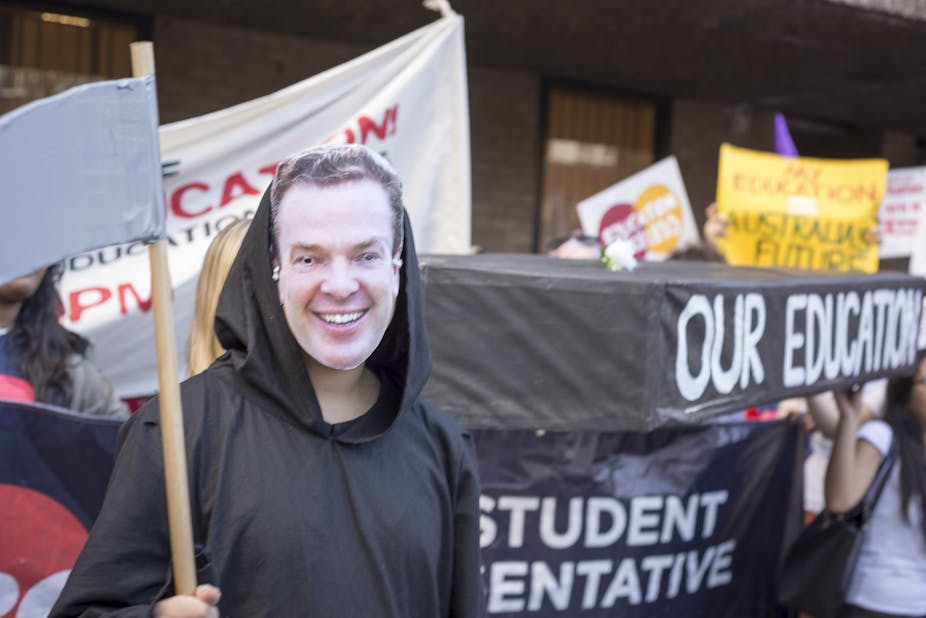The federal education minister, Christopher Pyne, says his changes to higher education including fee increases and deregulation of the sector will be fairer, since those who benefit from higher education will not draw on the taxes of those less fortunate. Others oppose it, suggesting higher fees will deter low socio-economic students, making universities havens for the rich. The problem with these arguments is that both overlook the source of the problem. By focusing on fees, it keeps the debate in a space that Pyne can win.
Fees are unlikely to deter many people from enrolling in university, certainly not at the old elite Group of Eight universities. The threat to equality in Pyne’s plan is not in fees, but in deregulation. The type of deregulation Pyne envisages - where price is regulated by demand in a more open competitive marketplace - will structure inequality into the very bones of Australian higher education and the labour market that it feeds.
Do fees deter low-SES enrolments?
Pyne’s arguments are the same as Labor’s when they designed the Higher Education Contribution Scheme (HECS) in 1988. Back then, when free education was overturned, many also feared universities would become more elite. They didn’t.
Andrew Norton, reviewer of the demand-driven system, is right to say that income-contingent loans have offset any general tendency for higher fees to deter low socio-economic students. But we should not congratulate ourselves too much. Enrolment rates for low socio-economic students were abysmal before 1988 and still are.
The reasons are complex but important; unless everyone has an equal starting chance of accessing university, no one really competes with the best – merit becomes a myth. Right now your chances of entering an elite university in Australia strongly correlate with your proximity to a major city and the paleness of your skin. Since no one can claim that intelligence is also white and urban, this means universities must miss some of our best talent.
Small progress was achieved under recent efforts such as the participation and partnerships program. While fees matter – and their method of repayment even more so – when it comes to equity, it is a bit of a furphy. The real threat to equity is deregulation: while universities compete with one another, no one can compete with them for the gateway to the labour market.
How competition will ‘class’ students
Pyne argues that our elite universities need to be higher quality so we do not lose international students. He suggests increased competition from private institutions will achieve this. If universities need to compete harder to get additional money, they need to offer quality education.
This sounds good. But Pyne is overlooking a few things.
First, Australia’s public university system is unlike the USA’s or Britain’s in this respect. Wealthy parents will pay for education – but at school, so their children are set on the path to (say) law at Sydney or medicine at Melbourne. No private institution will ever compete with that prestige.
This is why the Group of Eight has supported competition; they will not actually have any. They will be able to sit atop the deregulated pile and charge whatever fees they like.
What are the private institutions for then? Some will be elite, specialised colleges, like the design school Tony Abbott’s daughter attended, but the intention is also that private colleges will sequester low socio-economic students or those with a lower ATAR away from the elite and offer a low-fee “pathway” to higher education. There is no prospect of competition between this private sector and the elite universities.
Why competition will not drive down price
Group of Eight chair Ian Young argued that the financial success of universities in a competitive system will depend on students’ perception of the worth of tertiary study. But there is in fact no need for universities to persuade the public they offer value: over the course of the 20th century universities captured the gateway to the best bits of the job market. Some 70 years ago university would be one way to power and wealth in society; now it is almost the only way. This also makes it the path to social mobility.
In a deregulated system the middle class will be held to ransom by our big old elite institutions. They will have to pay whatever the Group of Eight ask, or lose status. Universities will be able to charge as much as the middle class can bear.
Why it is not a question of consumer choice
Of course people could just choose not to go to university. Pyne’s focus on fees makes it sound as if this is plausible, just a matter of consumer choice – if it is not worth it, don’t invest.
But, if universities already own the pathway to most decent jobs, as higher education expands still further Australians will have little choice. And this is what will empower institutions to keep raising fees.
For disadvantaged groups, choosing not to go to university may well become the best choice but it will perpetuate disadvantage. Deregulation will structure this inequity into our educational system.
Read The Conversation’s coverage of fee deregulation and proposed changes to the sector in the 2014 federal budget here.

